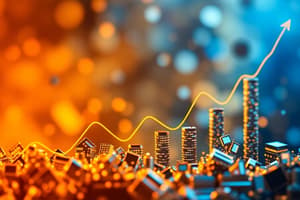Podcast
Questions and Answers
What drives economic choices and necessitates trade-offs in economics?
What drives economic choices and necessitates trade-offs in economics?
- Abundance of resources
- Fundamental problem of scarcity (correct)
- Consumer preferences
- Technological advancements
Which aspect is not primarily studied in microeconomics?
Which aspect is not primarily studied in microeconomics?
- Individual consumer behavior
- National GDP growth (correct)
- Market structures
- Price determination
What does inflation refer to in economic terms?
What does inflation refer to in economic terms?
- A general increase in prices (correct)
- The total production of goods
- A rise in unemployment rates
- A decrease in consumer spending
In a market economy, how are resources primarily allocated?
In a market economy, how are resources primarily allocated?
Which of the following best defines opportunity cost?
Which of the following best defines opportunity cost?
What is meant by elasticity in economics?
What is meant by elasticity in economics?
Which of the following is a focus area of macroeconomics?
Which of the following is a focus area of macroeconomics?
Which of the following is NOT a measure of economic performance?
Which of the following is NOT a measure of economic performance?
What best describes a command economy?
What best describes a command economy?
Which economic school emphasizes the unpredictability of the economy?
Which economic school emphasizes the unpredictability of the economy?
What does fiscal policy mainly involve?
What does fiscal policy mainly involve?
Which of the following best defines inflation rate?
Which of the following best defines inflation rate?
What is the primary focus of labor economics?
What is the primary focus of labor economics?
Which policy is focused on controlling the money supply?
Which policy is focused on controlling the money supply?
What type of economy is characterized by a combination of market and command elements?
What type of economy is characterized by a combination of market and command elements?
Which indicator measures how quickly the economy is expanding?
Which indicator measures how quickly the economy is expanding?
Flashcards
Command Economy
Command Economy
Economic system where a central authority, often the government, controls resource allocation and production.
Mixed Economy
Mixed Economy
A blend of market and command economies, allowing for private enterprise with government regulation and intervention.
Scarcity
Scarcity
The fundamental economic problem of unlimited wants and needs in the face of limited resources.
Classical Economics
Classical Economics
Signup and view all the flashcards
Keynesian Economics
Keynesian Economics
Signup and view all the flashcards
Opportunity Cost
Opportunity Cost
Signup and view all the flashcards
Supply and Demand
Supply and Demand
Signup and view all the flashcards
Monetarism
Monetarism
Signup and view all the flashcards
Austrian Economics
Austrian Economics
Signup and view all the flashcards
Elasticity
Elasticity
Signup and view all the flashcards
Fiscal Policy
Fiscal Policy
Signup and view all the flashcards
GDP (Gross Domestic Product)
GDP (Gross Domestic Product)
Signup and view all the flashcards
Monetary Policy
Monetary Policy
Signup and view all the flashcards
Inflation
Inflation
Signup and view all the flashcards
Unemployment
Unemployment
Signup and view all the flashcards
Economic Growth
Economic Growth
Signup and view all the flashcards
Study Notes
Introduction to Economics
- Economics is the social science studying how societies allocate scarce resources to meet unlimited wants and needs.
- It analyzes production, consumption, and distribution of goods and services.
- Scarcity is the fundamental economic problem, driving choices and trade-offs.
Microeconomics
- Focuses on individual economic agents (consumers and firms).
- Examines market functions, price determination, and resource allocation at an individual level.
- Covers supply and demand, elasticity, market structures (perfect competition, monopoly, oligopoly), production costs, and consumer behavior.
- Individual choices influence the overall economy.
Macroeconomics
- Studies the overall economy's performance and behavior.
- Focuses on aggregate variables like GDP, inflation, unemployment, and economic growth.
- Examines government policies' impact on the economy.
- Includes fiscal policy (government spending and taxation), monetary policy (central bank actions), and economic fluctuations.
Key Economic Concepts
- Scarcity: Unlimited wants and needs in a world with limited resources.
- Opportunity Cost: The value of the next best alternative forgone.
- Supply and Demand: Buyers' desires (demand) and sellers' offerings (supply) determine price and quantity.
- Elasticity: Measures how responsive one variable is to changes in another.
- GDP (Gross Domestic Product): Total value of final goods and services produced within a country.
- Inflation: A sustained increase in overall prices.
- Unemployment: Percentage of the labor force actively seeking work but unable to find it.
- Economic Growth: Increase in the economy's capacity to produce, improving living standards.
Types of Economic Systems
- Market Economy: Resource allocation through markets and prices.
- Command Economy: Central authority allocates resources.
- Mixed Economy: Combines market and command elements; most economies are mixed.
Schools of Economic Thought
- Classical Economics: Emphasis on free markets and limited government intervention.
- Keynesian Economics: Promotes government intervention to stabilize the economy during recessions.
- Monetarism: Focuses on controlling the money supply to stabilize the economy.
- Austrian Economics: Emphasizes individual actions and the economy's unpredictable nature, opposing intervention.
Policies and Tools of Economic Management
- Fiscal Policy: Government actions regarding taxation and spending.
- Monetary Policy: Central bank actions affecting money supply and interest rates.
- Regulation: Setting rules to address market failures or externalities.
- Trade Policy: Governs international trade (tariffs, quotas).
Economic Indicators
- GDP growth rate: Measures economic expansion.
- Inflation rate: Shows price increase.
- Unemployment rate: Percentage of jobless individuals seeking work.
- Consumer Price Index (CPI): Tracks average consumer prices.
Branches Within Economics
- Labor Economics: Studies labor supply, demand, wages, employment policies.
- International Economics: Analyses international economic interactions (trade, exchange rates, investment).
- Development Economics: Focuses on growth and poverty reduction in developing countries.
- Environmental Economics: Studies interactions between the economy and the environment (pollution, resources).
Studying That Suits You
Use AI to generate personalized quizzes and flashcards to suit your learning preferences.




